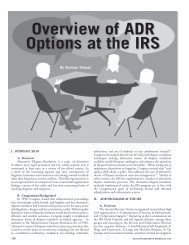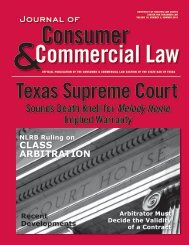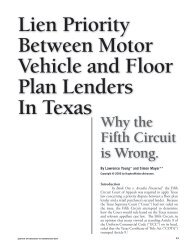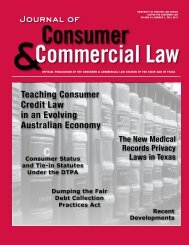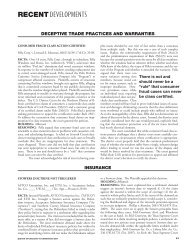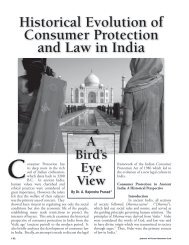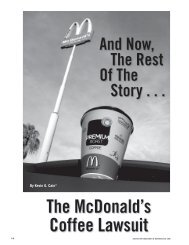Car Title Disputes - Journal of Consumer & Commercial Law
Car Title Disputes - Journal of Consumer & Commercial Law
Car Title Disputes - Journal of Consumer & Commercial Law
You also want an ePaper? Increase the reach of your titles
YUMPU automatically turns print PDFs into web optimized ePapers that Google loves.
consumer-buyer. Even when a consumer does not<br />
fi nd the automobile repossessed in the middle <strong>of</strong><br />
the night by the fl oorplanner, the dealer’s failure<br />
to obtain title and registration for the consumer<br />
will prevent the consumer from lawfully operating<br />
the vehicle. In effect, fl oorplanners usually try to<br />
assert that the consumer and retail fi nance entity<br />
that fi nanced the sale should bear the entire risk<br />
<strong>of</strong> loss from the dealer’s failure to pay.<br />
To obtain a license to sell vehicles, used car<br />
dealers are required to have a $25,000 bond in place to<br />
cover damages incurred by buyers and others when title<br />
does not pass correctly. 1 As currently construed, this law<br />
permits consumers, retail fi nance entities and wholesalers<br />
to sue dealers who are <strong>of</strong>ten defunct, obtain judgments,<br />
and then recover the amount <strong>of</strong> these judgments against<br />
the applicable dealer bond <strong>of</strong> $25,000. 2 Interestingly<br />
enough, fl oorplanners would usually have no claim to<br />
recovery under the bond. 3<br />
Problems frequently arise because the $25,000<br />
bond will usually only cover the loss associated with one<br />
or two automobiles. The bond also only covers claims<br />
occurring during the 12-month term <strong>of</strong> the bond that<br />
have been reduced to judgment. These bonds are sureties<br />
which most <strong>of</strong>ten pay claims in order <strong>of</strong> presentment.<br />
Thus, the surety bond is paid on a fi rst-come-fi rst-serve basis<br />
with the fi rst claimant recovering up to the amount <strong>of</strong> the<br />
$25,000 face value <strong>of</strong> the bond, reducing the value, while<br />
each subsequent claim reduces the value <strong>of</strong> the bond until<br />
fully depleted. When a dealer sells out <strong>of</strong> trust, however, it is<br />
common for the dealer to sell a whole raft <strong>of</strong> vehicles out <strong>of</strong><br />
trust before it is discovered. When the minimal dealer bond<br />
is not enough to cover the potential loss, the question <strong>of</strong> who<br />
bears the risk <strong>of</strong> loss must be addressed squarely. Unfortunately,<br />
in these circumstances, the law in Texas is not clear on the<br />
placement <strong>of</strong> the risk <strong>of</strong> loss.<br />
B. Who should bear the risk <strong>of</strong> loss?<br />
The fl oorplanner, who holds the position that the<br />
consumer and retail fi nance entity should bear the full risk<br />
<strong>of</strong> the loss, will usually argue that the purported sale <strong>of</strong> the<br />
vehicle to the consumer by the dealer was void due to the<br />
failure <strong>of</strong> the dealer to possess title or to transfer title at the<br />
time <strong>of</strong> sale. Floorplanners rely specifi cally on the Texas<br />
Transportation Code (hereinafter “Transportation Code”),<br />
and in particular the Certifi cate <strong>of</strong> <strong>Title</strong> Act (hereinafter<br />
“COTA”). 4 The Transportation Code § 501.071(a) provides<br />
that “[a] motor vehicle may not be the subject <strong>of</strong> a subsequent<br />
sale unless the owner designated on the certifi cate <strong>of</strong> title<br />
transfers the certifi cate <strong>of</strong> title at the time <strong>of</strong> sale.” 5 In addition,<br />
Transportation Code § 501.152 provides that it is an <strong>of</strong>fense to<br />
sell or <strong>of</strong>fer to sell a motor vehicle registered in this state when<br />
the seller “does not possess the title receipt or certifi cate <strong>of</strong><br />
title for the vehicle.” 6 Thus, since the Transportation Code, §<br />
501.073 provides that “[a] sale made in violation <strong>of</strong> this chapter<br />
is void and title may not pass . . . ,” 7 fl oorplanners argue that no<br />
title passes when they are holding the title and the dealer did<br />
not transfer title at the time <strong>of</strong> the purported sale.<br />
In a number <strong>of</strong> cases where fl oorplanners, wholesalers<br />
and other sellers were paid with drafts that bounced, several<br />
Texas appellate courts have accepted this COTA argument and<br />
have found subsequent sales by dealers to be void. 8 What does<br />
this mean in practice? The fl oorplanner retains title, is entitled<br />
to possession <strong>of</strong> the vehicle sold out <strong>of</strong> trust, and the innocent<br />
consumer must bear the entire risk <strong>of</strong> loss. The practical result<br />
T o obtain a<br />
license to sell<br />
vehicles, used<br />
car dealers<br />
are required to<br />
have a $25,000<br />
bond in place to<br />
cover damages<br />
incurred by<br />
buyers and<br />
others when title<br />
does not pass<br />
correctly.<br />
places every consumer in peril. Giving legal<br />
signifi cance to the mere possession <strong>of</strong> a<br />
certifi cate <strong>of</strong> title provides the fl oorplanning<br />
lender the best <strong>of</strong> both worlds by permitting<br />
it’s inventory collateral to be exposed for<br />
sale to the public from which proceeds are<br />
generated for the dealer to pay the secured<br />
debt, and empowering that lender to render<br />
void, retroactively, any sale <strong>of</strong> which it does<br />
not approve.<br />
1. Agency Exception<br />
In an effort to ameliorate the<br />
harshness <strong>of</strong> this COTA rule, other courts<br />
have found an exception based on an<br />
agency relationship between the dealer<br />
and the fl oorplanner. Initially, these courts<br />
cite to the recognized rule that a sale <strong>of</strong> an<br />
automobile may still be valid as between a<br />
buyer and a seller despite non-compliance<br />
with COTA. 9 If proven that the dealer was<br />
acting as the agent <strong>of</strong> the fl oorplanner in<br />
selling the vehicle, a number <strong>of</strong> courts have<br />
recognized that the innocent consumer<br />
who purchased from the dealer is entitled to<br />
retain possession and to receive title, even if<br />
COTA was violated in the process. 10 These courts recognize<br />
that if the dealer as agent <strong>of</strong> the fl oorplanner was authorized to<br />
sell a vehicle to the buyer, the sale would be effective as between<br />
the fl oorplanner (the actual seller) and the buyer. 11 Under<br />
these circumstances, the fl oorplanner would bear the risk <strong>of</strong> loss<br />
associated with its own agent’s faithlessness. 12 In other words,<br />
the fl oorplanner would bear the loss <strong>of</strong> the money that the dealer<br />
failed to pass on to the fl oorplanner following the sale.<br />
This agency exception to the general rule requiring<br />
compliance with COTA does not always provide protection to<br />
innocent consumers. For example, in Morey v. Page, the Dallas<br />
Court <strong>of</strong> Appeals found inadequate evidence <strong>of</strong> the agency<br />
relationship. 13 In that case, Page consigned a 1967 Bentley for<br />
sale by Yardley under the stipulation that he recover a $20,000<br />
net pr<strong>of</strong>i t. Yardley negotiated the sale <strong>of</strong> the Bentley to Morey<br />
for only $9,000, and Yardley absconded with these funds. The<br />
Dallas Court <strong>of</strong> Appeals found no express authority for the<br />
sale due to the failure to meet the consignment condition <strong>of</strong> a<br />
$20,000 net return and no apparent authority due to the fact<br />
that Yardley never disclosed that he was acting on behalf <strong>of</strong><br />
Page. 14 Given the fact that the strength <strong>of</strong> the evidence in<br />
favor <strong>of</strong> agency will vary greatly between different cases, this<br />
exception provides at best an uncertain lifeline to innocent<br />
purchasers. If the innocent purchaser is buying from a licensed<br />
dealer, in a transaction that has the appearance <strong>of</strong> a sale in the<br />
ordinary course <strong>of</strong> the dealer’s business, why should the validity<br />
<strong>of</strong> the sale be dependent upon a prior transaction between<br />
the dealer and an undisclosed principal? The Texas Uniform<br />
<strong>Commercial</strong> Code 15 (hereinafter “U.C.C.”) provides rules <strong>of</strong><br />
priority that protect buyers in the ordinary course <strong>of</strong> business<br />
in such circumstances.<br />
2. U.C.C. alternative<br />
If the U.C.C. applies in the context <strong>of</strong> a sale out <strong>of</strong><br />
trust by a dealer, an innocent purchaser would be accorded<br />
title and the risk <strong>of</strong> loss associated with the dealer’s defalcation<br />
would be placed squarely upon the fl oorplanner. In a majority<br />
<strong>of</strong> the states, the U.C.C. prevails over the applicable COTA in<br />
cases involving out <strong>of</strong> trust sales. 16 Interestingly enough, the<br />
Transportation Code specifi cally provides that it is to yield to<br />
the U.C.C. where there is a confl ict between these two bodies<br />
142 <strong>Journal</strong> <strong>of</strong> Texas <strong>Consumer</strong> <strong>Law</strong>



